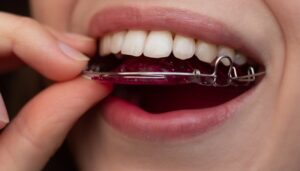
After orthodontic treatment, retainers are essential to maintaining your results. At VIP Smiles Orthodontics in Jackson, we provide custom-fitted retainers designed for long-term comfort and durability. To learn more about your retainer options, call (601) 321-9216 and schedule a consultation today.
Different Types of Retainers And How They Work
After completing orthodontic treatment, wearing a retainer is an important next step. Retainers help maintain your new smile by keeping teeth in their corrected positions. Without proper retention, teeth can gradually shift back, undoing months or years of hard work.
If you’re in Jackson and new to retainers, understanding the different types available can help you feel more comfortable about this part of your orthodontic journey. Each retainer has its own design, benefits, and care requirements.
Why Wearing a Retainer Matters
Teeth are supported by bone and soft tissue that remodel slowly. After braces or aligners move your teeth, these tissues need time to stabilize around the new position. Retainers act as a holding device to prevent unwanted movement while this healing happens.
Retention is not a temporary phase. Most orthodontists recommend lifelong retainer wear—at least part-time—to maintain alignment and avoid relapse. The frequency and duration of wear depend on your individual case and your orthodontist’s instructions.
Common Types Of Retainers
Orthodontic retainers fall into two broad categories: removable and fixed. Both serve the same purpose but differ in how they are worn and maintained.
Hawley Retainers
Hawley retainers are among the most traditional and widely used. They consist of a sturdy metal wire that fits across the front teeth and a custom-molded acrylic base that rests against the roof of the mouth or inside the lower jaw.
- Advantages: Durable and adjustable; easy to clean; can last for many years with proper care.
- Disadvantages: More visible than clear retainers; may cause some speech adjustment initially; removable so it can be lost if not handled carefully.
Because the metal wire can be bent by your orthodontist, Hawley retainers allow for minor adjustments to tooth position after braces.
Clear Plastic Retainers
Also called Essix retainers, these are made from a thin, transparent plastic that fits snugly over your teeth. They resemble clear aligners and are often preferred by patients who want a less noticeable option.
- Advantages: Nearly invisible; lightweight and comfortable; easy to wear during activities and social situations.
- Disadvantages: Less durable than Hawley retainers; prone to cracking or warping if not cared for properly; may need replacement more frequently.
Clear retainers must be cleaned regularly to avoid staining and odors. Avoid hot water or harsh chemicals that can damage the plastic.
Fixed Or Bonded Retainers
Fixed retainers are thin metal wires permanently bonded to the back of your front teeth, usually on the lower jaw. This type of retainer is not removable and provides continuous support.
- Advantages: No need to remember to wear it; discreet since it is behind teeth; effective at preventing relapse in the front teeth.
- Disadvantages: Requires careful cleaning to prevent plaque buildup; may feel unusual initially; risk of wire loosening or breakage.
Your orthodontist will check the bonded retainer during regular visits to ensure it remains secure and in good condition.
Choosing The Right Option For You
Your orthodontist will recommend a retainer type based on your specific needs, treatment plan, and lifestyle. Some patients even use a combination of fixed and removable retainers for maximum retention.
Factors that influence retainer choice include:
- Your bite and teeth alignment
- Risk of relapse based on past dental history
- Personal preferences for appearance and convenience
- Ability to maintain good oral hygiene
Discuss any concerns you have about comfort, appearance, or care with your orthodontist before your retainers are made.
Caring For Your Retainer
Proper retainer care extends its lifespan and helps maintain oral health.
- Clean removable retainers daily with a soft toothbrush and mild soap or special cleaning tablets. Avoid toothpaste, which can be abrasive.
- Keep your retainer in its case when not in use to prevent damage or loss.
- For fixed retainers, use floss threaders or interdental brushes to clean around the wire carefully.
- Avoid exposing retainers to heat or harsh chemicals.
- Attend regular orthodontic checkups so your doctor can monitor the retainer’s condition.
Neglecting retainer care can lead to plaque buildup, bad breath, and increased risk of cavities.
Common Questions About Retainers
- How long do I need to wear my retainer? Most orthodontists suggest full-time wear for several months, then switching to nighttime use indefinitely. Your exact schedule will depend on your treatment and dentist’s advice.
- What if I lose my retainer? Contact your orthodontist as soon as possible to order a replacement. Going without a retainer can allow teeth to shift quickly.
- Can I eat or drink with my retainer? Removable retainers should be taken out when eating or drinking anything other than water. Fixed retainers do not need to be removed but require careful cleaning.
- Will my retainer affect my speech? Some initial adjustment is normal, especially with removable types. Most people adapt within a few days.
Retainers play a vital role in preserving your orthodontic results. Knowing the differences between Hawley, clear plastic, and fixed retainers can help you feel more confident in your choice.
Retainers: Protect the Smile You’ve Built
Wearing a retainer after orthodontic treatment is key to keeping your smile aligned. VIP Smiles Orthodontics in Jackson provides high-quality, custom retainers to help maintain your results for the long term. Call (601) 321-9216 to schedule your consultation and keep your smile on track.